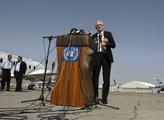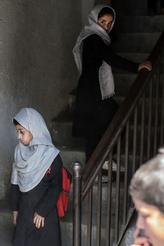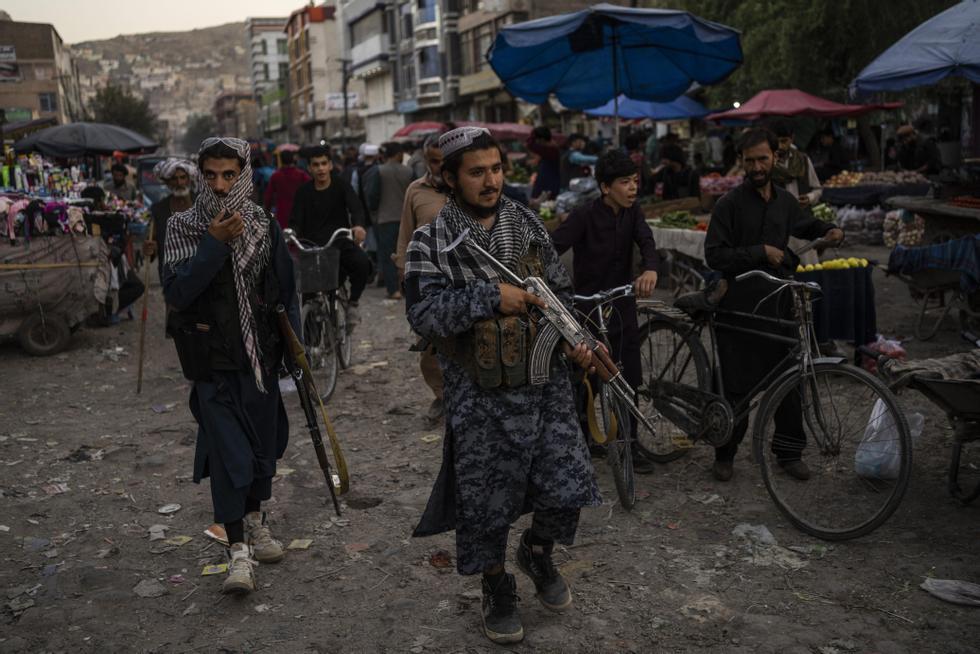Millions now have higher education. Kai Eide says: An entire generation of Afghans has grown up with the power to build the country.
Few Norwegians followed Afghanistan more closely than the former great diplomat. Eddy has served as Norway’s ambassador to a number of Norwegian diplomatic missions, as well as both the Organization for Security and Cooperation in Europe and the North Atlantic Treaty Organization. From 2008 to 2010, he served as the United Nations Special Envoy for Afghanistan.
Despite the war, and the fact that a large number of Afghans still live in extreme poverty, Afghanistan has seen positive development in a number of areas in the past two decades. Per capita income doubled, life expectancy increased by nine years. Children attend school longer, and the number of students has increased tenfold, according to the United Nations Development Programme. Perhaps the most amazing “news” in the progression series:
When the Taliban captured Kabul in mid-August, 40 percent of schoolchildren were girls – unimaginable when the movement last came to power.
Eide says he was surprised when he visited Afghanistan a few years after quitting his job as a UN special envoy.
“Young, educated Afghans have taken over the work of the Ministry of Interior from foreign advisers,” he says.
A completely different country
In addition to the “tremendous” progress in education, and the fact that Afghanistan has established democratic institutions, Eide points out that there are now hospitals and clinics in most of Afghanistan’s provinces. He says the health sector has completely changed in twenty years.
– In some areas, there are relatively advanced health systems of a good standard, depending on the conditions. The former senior diplomat says a basic health service has now been built that covers the vast majority of the Afghan population.
Eddy also notes the progress that has been made in Afghans’ access to information, in opportunities for expression.
A rich media landscape has developed, without censorship – accessible to a large percentage of the Afghan population. Public discourse has been marked by dissent, and the newly discovered freedom of expression is so closely tied to women’s rights that a movement has emerged capable of entering a conversation about the status of women in the public sphere, says Eddy.

Taliban fighters patrol the market in the old city of Kabul after the movement took control of the Afghan capital. The Taliban may have changed something, but they’ve never been in a position to have to manage everything that’s been built now, says Kai Eddy. Photo: Bernat Armangue/AP/NTB
Looting and lawless conditions
Kai Eide believes that President Ashraf Ghani left Kabul because he feared for his life.
– I finally realized that the battle had been lost. The news of the president’s disappearance during the night shocked everyone and led to a power vacuum, with lawlessness and widespread looting. This resulted in a chaotic evacuation. There has also been a breach of an agreement with the Taliban, whereby the president will not leave the country until an interim government is formed, precisely to avoid chaos. The Taliban had promised not to enter Kabul until this operation was completed. Sources in the movement told me that in this case they took Kabul to fill the void that had arisen. Eddie says, I already believe in that.
– What do you think about the ability and ability of the Taliban to take care of everything that has been achieved, for example in the education sector?
They understand that education is important, and they don’t want to put a line above all that has been achieved. But they say they should view everything according to Islamic traditions and Afghan culture, and this is the key to understanding how they will shape the education system in the future. The system approach is already affecting women’s education.

Kai Eide arrived in Kabul as the new UN special envoy in March 2008. Since then, Afghanistan has seen significant progress, but after the Taliban seized power, much has become uncertain. Photo: Omar Sobhani/Reuters/NTP
Eddy also notes the Taliban’s references to women’s sports.
– They mentioned that women are not allowed to exercise because there is a risk of skin breakouts. This says a lot about the line the Taliban will take. There is no doubt that women’s rights and freedom of expression will be severely weakened.
Eide notes that the Taliban is an insurgency that has been on the battlefield for decades.
– They have never been in a situation where they have to manage everything that is now created. They may have changed somewhat since they last came to power, but they have never come into contact with all the tools with which modern society was created.
Eide believes that the Islamic movement depends entirely on the employment of part of the Afghan population who have an education and work in ministries and other institutions.
If they want to succeed, they must build confidence. For now, they’re going in the wrong direction – and many ministries are now just empty shells. The Taliban depend on filling them with knowledge. It will also be a challenge, said the former senior diplomat, due to a lack of funds for operations, to pay salaries, as Western countries have frozen Afghanistan’s private money in foreign banks and large portions of aid.
– Hardliner has control
Kai Eide believes that the Taliban are now having a conversation with themselves about how they relate to the West.
– Today it seems that the conservative forces within a conservative movement have the upper hand.
– men NSIs there a difference between the Taliban we see today – and the Taliban that negotiated?
– Yes, they have now shown a tighter stance than I experienced in Doha. But there were always differences between the political committee – the negotiators we met in Doha – and the military side that was on the battlefield in Afghanistan.
– There have been recent reports of a rift between the Taliban’s new refugee minister, Khalil Rahman Haqqani of the Haqqani Network, and Deputy Prime Minister Abdul Ghani Baradar. It is said that Baradar left Kabul?
– This is a key point. How will the Taliban’s internal dynamics appear in the future? The composition of the new government is characterized by extremist, a huge disappointment. I had indirect contact with Baradar already in 2009 because we identified that he was among the Taliban leaders who advocated a line of negotiations, Eide says.
He says Baradar was an important point of contact, but at one point ISI placed him under house arrest.
– And then, overnight, we lost all dialogue with the movement. When he was released and led the Doha negotiations, it was an affirmation of his importance for dialogue. There are enough contradictions between him and the Haqqani network that now dominates the leadership in Kabul, but I don’t think Baradar is out of the game. Discussions like this show that there is disagreement within the Taliban about how to proceed.
– Maybe you’re too naive
What would you do differently, if you could go back in time, and take on the job of the UN Special Envoy again?
– I wanted to make sure I had more knowledge of Afghan culture and history before I started working. I will also be clearer about the necessity of negotiations before it is too late. In addition, I would insist that states that ask the UN to coordinate civil and political efforts, also give the UN the space and competence to do such coordination, Eide says.
He thinks about it, given when negotiations began in the Qatari capital, Doha.
At that time, it struck me that there were so many things that it would be impossible to agree on, and that there were simply no compromises. One was about the future political system, with free elections. The Taliban delegation never uttered a word of choice. Finding a middle ground between the Taliban emirate and a democratic republic may be impossible. The second relates to women’s rights, as the Taliban has always emphasized that women should enjoy all rights, but with the addition “in keeping with Islamic traditions and Afghan culture.”

When the Taliban seized power in Afghanistan, only boys were allowed to go to school. After 20 years, the number of students has increased tenfold, and about 40 percent of the students are girls. The Taliban realize that education is important and do not want to place a line above all that has been achieved. But they say they should view everything according to Islamic traditions and Afghan culture, and this is the key to understanding how they will shape the education system in the future, says Kai Eide. Photo: Bulent Kilic/AFP/NTB
– Perhaps I was too naive when I thought a negotiated solution was possible. But it is not only the Taliban that is responsible for this failure. Until very recently, Ghani and his team believed that the war could be won militarily, and Ghani’s reluctance contributed to the failure to find a solution. For many years there was little enthusiasm for negotiations on the part of the international community. On both sides, many believed in military victory. But the greater responsibility for this sad development still lies in the unilateral agreement that Trump made with the Taliban.
According to the former diplomat, the unstable economic situation and the initial signs of the new regime put Western countries in a big bind.
– It will be a very harsh fall and winter for many Afghans. I think it is fair to say that we are facing a famine. It is possible that the international community will make great efforts to provide humanitarian support, but the emergency aid is not enough now. We have to help ensure that water and electricity continue to be supplied, Eddie says, that people have access to lift services, and that children have a school to go to.
He believes that Afghanistan is a good example of human rights dilemmas.
– Should state authorities be so forcefully protested that one should punish ordinary people? Or should one prioritize reducing human suffering—and thus transcending one’s ideals?
Is this the dilemma of the times we are facing now in Afghanistan?
It is at least among the greatest dilemmas of our time. But we may have no choice but to focus on the lives and health of the Afghan people. This means that some camels must be swallowed and an acceptable degree of commitment must be found.
– So what exactly should the authorities of Norway and allied countries do?
– I think they have to adapt to interact with the new system. One of the most important things is the release of funds, whether in Afghanistan in foreign banks or for assistance programs initiated by the World Bank and the International Monetary Fund. The Norwegian authorities should aim for the freeze to be unacceptable. We need to start from there so that the economy does not collapse. Eddy says the Afghan people are the most important now.
(This article was first published in current aid).

“Organizer. Social media geek. General communicator. Bacon scholar. Proud pop culture trailblazer.”

